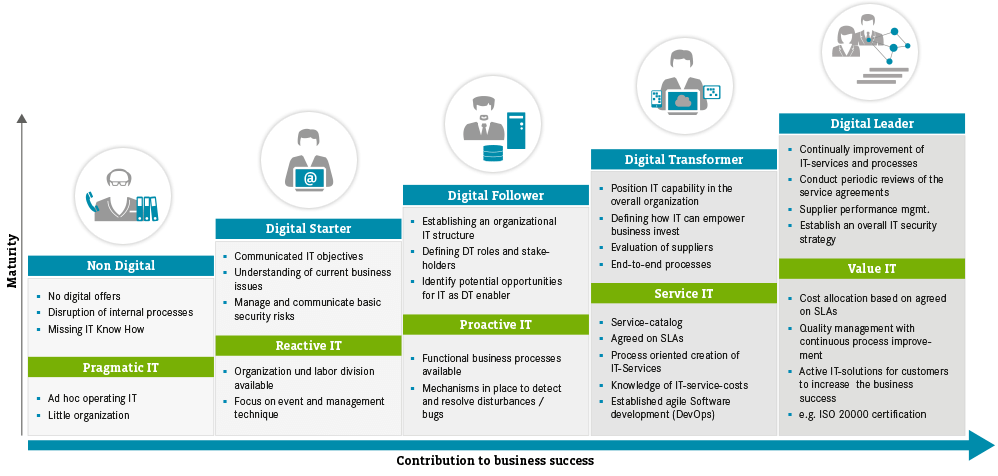
A couple of weeks ago I was asked to name the three hot topics for IT this year. A lot of things came to my mind, but one of the most obvious not: The Digital Transformation. Why is that?
Before we go into detail, let’s talk about some basic things first.
Different meanings of Digital Transformation
There is no doubt that Digital Transformation is one of today’s most heard buzzwords, both on IT and business side. But what exactly does it mean? Well, it depends. In my opinion, the real Digital Transformation is basically the – often disruptive – transformation of a formerly “analogue” business into an IT driven, digital business. Many people also see business process optimisation and the subsequent digital implementation also as Digital Transformation, although this is nothing more than Business (Process) Automation. More on this later.
To add to the confusion, there is also the widespread misunderstanding (especially in German speaking countries) of Digitisation (German: Digitalisierung) versus Digital Transformation (German: saying Digitalisierung but meaning Digitale Transformation). People also very often use Digitalisierung as a synonym for a digital implementation of processes.
Talking about Business Process Automation: This has been a core competence of IT ever since. Starting with the finance sector in the early years, IT has automated a lot of processes throughout the whole value chain and is still doing so. So, who should be in charge of the digital future, if not IT?
BTW: What do you get when you automate a bad manual process? Right: A bad automated process. So before thinking about a big Digital Transformation, you should start with your processes by first optimising them, and then automating (“digitising”) them, in close cooperation with IT.
IT needs to understand the business
In order to successfully support, if not drive, the Digital Transformation, IT needs to fully understand the business and the underlying processes. In most cases this can only be achieved when there is a corporate IT which is highly integrated with the business, and not just some fully outsourced service provider, the staff of which will never identify with the company they are providing the services for. In addition, an external service provider will only drive innovation insofar as it fits into his business model and strategy.
The following chart taken from a slightly old but still relevant post by Campana + Schott perfectly shows the necessary evolution of IT:

The challenge here is that in many companies the internal IT was never developed to a stage where it would be capable of driving the Digital Transformation, which leads to the development of dedicated Digital Transformation departments – sometimes even under a board member other than where IT resides. I personally think that this development is counter productive. It might probably work for large companies, where developing a second IT from scratch in parallel to the existing one or ones, is done faster than transforming IT to support and finally drive the whole process of getting the company digital.
Digital Transformation by a dedicated department?
The reason why I doubt that a separate Digital IT department is the way forward is, that I have seen bad examples of lighthouse projects being developed with only little or no IT interaction, which were after their “implementation” thrown over the fence to IT to run something which looks good on paper, but was not thought through to the point where someone has to run and maintain it – no procedures, no handover from legacy systems, and so on.
Conclusion: Neither IT nor Business – Both!
In the ideal world, where IT is closely working together with the business, and where there is a mutual understanding of each other’s job, both parties together should drive the Digital Transformation, with IT providing the technological basis and the business filling it with content. Without IT there is no Digital Transformation!
Further reading
A good read on the role of IT is this post by Campana + Schott.



Hi Dirk, thanks a lot for putting together this blog post and for sharing it along. I have just bumped into it via LinkedIn and have just finished reading it. Quite thought-provoking the first sentence of your conclusion, although I wish it were more of a reality than the ideal.
I must admit I’m certainly missing the good old days when the Enterprise Social Networking platforms were taking organisations by storm and there was a strong and rather fruitful partnership between IT and the business, where the former understood its critical role as a facilitator of change and that so-called digital transformation supporting the business in that journey, having come earlier on from executing that role of being a gatekeeper.
Alas, with the move now (over the last 4 or 5 years) to cloud-based productivity apps and away from ESNs (to a certain extent) I am noticing how IT is taking back that role of the gatekeeper more than the facilitator of the transformation, to the point where I keep seeing more and more organisations where the disconnect between IT and the business has never been greater and more poignant, coming from where were coming from.
I couldn’t have agreed more with you that there is not going to be a digital transformation without IT, but if IT themselves are the ones closing the door themselves from that transformation process as they take that role of gatekeeping we ought to figure out a way to open up conversations again, before it might be too late.
That journey to digital transformation has only just gotten started and we should not forget we ought to be playing for the long-term, not just the short-term of trying to keep up with that gatekeeping role. I’d love to learn some more about your thoughts on how both IT and the business can talk together, once more, like they used to in the good old days of ESNs. I miss those days …
Many thanks, once more, for writing and for sharing this blog post. It’s an important and relevant topic. Look forward to further conversations on it.
Luis, thanks for your inspiring comment. I will pick up your observation about the growing disconnect between as a topic for a future post – a very important topic indeed. I think that this threat applies especially to organisations that do not accept to change their culture to a more agile one, with cross functional teams and the necessary change in the mindset to make them successful. More on this later, thanks for the inspiration!
My next post will touch some of the aspects you also mentioned: It is about No Code applications created by end users and what they mean for IT. Stay tuned!
Hi Dirk, thanks a lot for the follow-up comment and for the wonderful feedback! I *love* your reflection on the need for cross-functional teams in order to influence a shift away from traditional silos and bureaucracy into more openness and transparency in knowledge sharing, for instance. I think that’s going to be our biggest challenges and where I have always been saying how IT plays the role of a facilitator and enabler of such transversal teams to help improve the way people work, collaborate and learn together.
I shall be looking forward to your upcoming blog posts on these topics, as I feel you are hitting the nerve on conversations that may not necessarily be new, but that are still incredibly relevant for today’s digital workplace environment. Thanks again for the follow-up feedback and look forward to your next write-up!